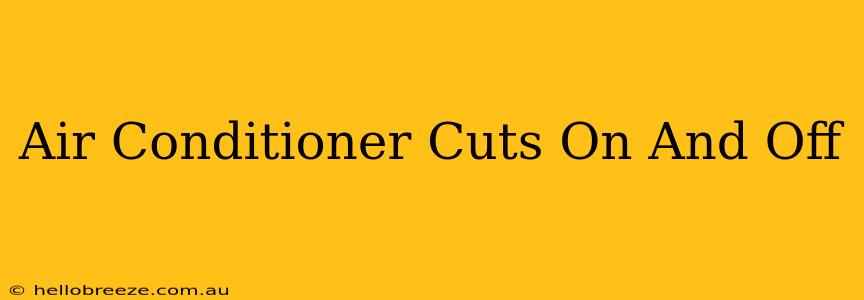Is your air conditioner turning on and off repeatedly, leaving you in a cycle of hot and cold? This frustrating problem can stem from several sources, but understanding the potential culprits can help you pinpoint the issue and get your AC back to providing consistent comfort. Let's dive into the common reasons why your AC keeps cycling and how to fix them.
Why Your AC Keeps Cycling On and Off
A constantly cycling AC unit, also known as short cycling, is more than just an inconvenience; it can also damage your system and increase your energy bills. Here are some of the most frequent causes:
1. Dirty Air Filter
This is the easiest and most common fix. A clogged air filter restricts airflow, forcing your AC to work harder and shut down sooner to prevent overheating. Regularly cleaning or replacing your air filter (ideally every 1-3 months) is crucial for maintaining optimal AC performance and extending its lifespan.
Solution: Check your filter and clean or replace it as needed. You’ll find a noticeable improvement in performance if this is the cause.
2. Frozen Evaporator Coil
A frozen evaporator coil is a serious problem that requires attention. This often occurs due to restricted airflow (dirty filter!), low refrigerant, or a malfunctioning defrost cycle. The ice buildup prevents proper heat absorption, causing the unit to cycle on and off.
Solution: If you suspect a frozen coil, turn off your AC immediately to prevent further damage. Allow the ice to melt naturally before attempting to diagnose the underlying issue. This may require professional assistance to identify whether it's a refrigerant issue or a more significant problem.
3. Refrigerant Leaks
Refrigerant is essential for your AC to function properly. Leaks cause a reduction in refrigerant levels, forcing the compressor to work harder and eventually shut down to prevent damage. Refrigerant leaks require professional attention as they involve specialized equipment and techniques to locate and repair the leak.
Solution: Call an HVAC technician. They'll identify the leak using specialized tools and recharge the system.
4. Capacitor Problems
The capacitor is a component that helps start and run the compressor motor. A failing capacitor can lead to inconsistent operation and cycling. This is usually indicated by the compressor struggling to start or run continuously.
Solution: Replacing the capacitor is a relatively simple task for experienced DIYers, but it's recommended to consult a professional if you're uncomfortable working with electrical components. Always disconnect the power before attempting any repairs.
5. Oversized AC Unit
An air conditioner that's too large for your space can cause short cycling. It cools the room down too quickly, shutting off before it removes enough humidity. This can make your home feel slightly damp and uncomfortable.
Solution: Unfortunately, this issue requires professional intervention to assess whether the AC unit is indeed oversized for the space and requires replacing with an appropriately sized unit.
6. Electrical Issues
Faulty wiring, tripped breakers, or problems with your electrical panel can disrupt the power supply to your AC unit, leading to unexpected shutdowns.
Solution: Check your circuit breaker box for tripped breakers. If the breaker keeps tripping, it's a sign of a more significant electrical issue requiring the attention of a qualified electrician.
Preventing Your AC from Cycling On and Off
Regular maintenance is key to avoiding these issues. Consider these preventative measures:
- Regular Filter Changes: Change your air filter every 1-3 months or as needed.
- Annual AC Tune-Ups: Schedule annual maintenance by a qualified HVAC technician. This proactive approach can catch problems early on, preventing major breakdowns and expensive repairs.
- Inspect Ductwork: Check for leaks or blockages in your ductwork. Proper airflow is crucial for efficient AC operation.
By addressing these potential causes and following preventative maintenance practices, you can ensure your AC unit operates smoothly, providing reliable and consistent cooling throughout the warmer months. Remember, contacting a qualified HVAC technician is always recommended if you're unsure about the cause or are uncomfortable performing repairs yourself.

